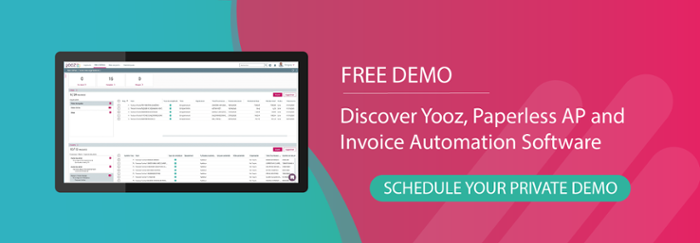In an increasingly interconnected world, we find ourselves occasionally seeking moments to rejuvenate, reset, and recharge; actively decreasing our connectivity and seeking solace in off-the-grid experiences. However, the reality is that cloud computing infrastructure has become an integral part of our daily lives, quietly working behind the scenes to empower the digital services on which we depend.
Whether streaming our favorite movies and music to accessing emails, documents, and photos from mobile devices anywhere, cloud computing has revolutionised the way that we interact with technology. But this transformation extends beyond our personal lives and individual experiences; it has also made significant inroads into the business world.
Today, robust and smart cloud accounting software is readily available, enabling organisations to streamline their invoicing processes using Accounts Payable automation.

Modern businesses need modern accounting software
Efficient financial management is crucial for modern businesses to stay competitive. When it comes to accounting software, businesses face a choice between two main options: cloud-based and on-premises (traditional) software.
Both offer unique advantages and considerations, making it more crucial to understand the key differences in order to make an informed decision. To help you, here are some comparisons between various benefits and drawbacks of the options including scalability, accessibility, and cost.
Understanding cloud computing software vs on-premise accounting software
Cloud-based Software-as-a-Service (SaaS) platforms are accessed via the internet, eliminating any need for local installation on individual devices or servers. If your business values seamless collaboration across multiple locations, near-real-time updates, and the ability to scale resources up or down based on demand, then cloud-based accounting software might be the ideal choice instead of traditonal on-premise accounting software.
Exploring on-premises accounting software
On-premises accounts payable software is installed and operated locally on your own servers, data centers, or IT infrastructure. Unlike Cloud-based SaaS accounting software applications, it requires dedicated resources and maintenance by your IT team. If your business prioritizes strict data security and privacy over accessibility, on-premises accounting software may be the better fit.

Comparing cloud-based vs on-premise for Accounts Payable
Consider the differences between the two options in the following four areas:
Accessibility
-
CLOUD-BASED: Cloud-based applications offer the anytime, anywhere access that we've come to expect in our modern lives. As long as there is a stable internet connection, you can securely access your data, process invoices, and manage payments from any device. This 'always on' mobility enables you to stay connected and make any crucial financial decisions whilst on the go, empowering your team to work efficiently and collaboratively.
-
ON-PREMISES: Unlike cloud-based applications, on-premises software remains accessible even without stable internet connectivity. This is especially advantageous in areas with limited or unreliable internet access. With this uninterrupted access to crucial financial data, you can continue processing invoices and managing payments without relying on external providers. By utilizing the best automated invoice processing software, you can further enhance efficiency and accuracy in your financial operations.
Security
-
CLOUD-BASED: Security is a top priority for cloud-based Accounts Payable applications when it comes to safeguarding sensitive financial information. To prevent unauthorised access or breaches (intentional or otherwise), all the leading providers implement robust security measures including data encryption, regular backups, and multi-factor authentication. data encryption, regular backups, and multi-factor authentication.
-
ON-PREMISES: On-premises accounts payable applications provide businesses with a higher level of control over their financial data. With the software hosted locally, you have complete ownership and control, minimising concerns about data privacy and breaches. This high level of control allows you to implement custom security measures and access controls tailored to your specific business requirements.
Scalability and Cost
-
CLOUD-BASED: Unmatched scalability is a hallmark of cloud-based Accounts Payable applications. They allow you to adapt and grow your processes as the business expands. Whether you experience seasonal variations in the amount of invoices or rapid growth, cloud-based software can accommodate specific needs without the hassle of hardware upgrades or additional infrastructure costs. You can easily add or removing users as required, ensuring your software grows alongside your business.
-
ON-PREMISES: A clear advantage of on-premises accounts payable applications is the ability to offer cost predictability. With an upfront investment, businesses gain a clear understanding of their long-term costs. Unlike subscription-based cloud solutions, where costs may vary as a business scales and adds users, using on-premises software involves a one-time purchase or a fixed license fee. This simplifies budgeting and expense forecasting over time.

Which system is best?
When it comes to choosing the right accounting system and software, you need to consider which is the right option for you. After all, each choice offers distinct advantages that can enhance your control, efficiency, and data security.
On-premises accounting software provides unparalleled control, ensuring data privacy and enabling specific customisation of workflows to suit business requirements. It maximises efficiency and allows you to keep any sensitive data within your own IT infrastructure, providing confidence in employing the security measures and complying with industry regulations. Offline accessibility, uninterrupted connectivity, and long-term cost predictability make it an appealing investment. Regular security updates, patches, and ongoing maintenance ensures smooth operation.
On the other hand, cloud accounting software eliminates the burden of infrastructure costs, maintenance, and software upgrades. By choosing this option, you can focus on the core tasks without the need to manage the technical aspects. Plus, it adds seamless accessibility and collaboration; if your team works remotely, no problem - cloud accounting software provides team members with secure access regardless of their location. Real-time data visibility, customisable reporting, and easy integration with existing software allows finance teams to make informed decisions quickly and efficiently.
Cloud accounting software vs on-premises for Accounts Payable
When it comes to Accounts Payable Automation, the benefits of cost-efficiency, scalability, and robust security offered by cloud-base accounting software have made it the preferred choice for rapidly scaling businesses with a variety of applications within their technology stack.
However, if you prioritise having more control, predictability with financial forecasting, and your own high level of data security within your own infrastructure then on-premises systems might be the better option for you.

Which should I choose?
When it comes to cloud-based versus on-premises for Accounts Payable, both solutions have their merits when it comes to Accounts Payable management. Cloud based systems leverage scalability, flexibility, and accessibility. This allows for seamless collaboration among teams, regardless of physical location. Working in the cloud also provides real-time updates, automated processes, and secure data storage.
Alternatively, some businesses prefer on-premises solutions to maintain full control over their infrastructure and data. This approach offers a higher degree of customisation and compliance with specific security requirements. However, it also requires a substantial upfront investment, needs ongoing maintenance, and involves dedicated IT resources. All of these can result in higher costs.
In conclusion
Ultimately, understanding the unique business needs and priorities of your organisation’s finance department will help determine which approach aligns best with your situation and goals. Whether you opt for the agility and collaboration of cloud-based solutions or the control and customisation of on-premises systems, embracing modern technology will undoubtedly streamline your processes and pave the way for success.







